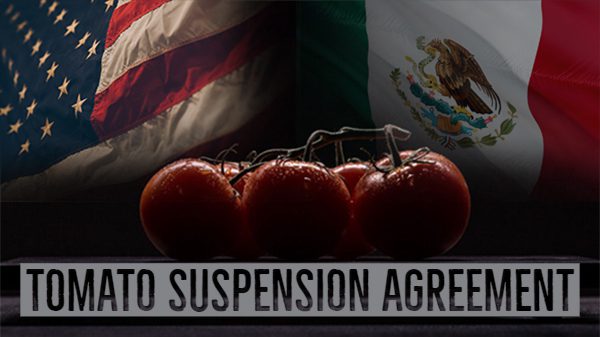
The Fresh Produce Association of the Americas (FPAA) {{BB #:144354}}, which represents importers of Latin American-grown products for the U.S. market, and the Florida Tomato Exchange (FTE) {{BB #:162441}}, which represents Florida tomato growers, continue to spar over charges of unfair Mexican trade practices in exporting fresh tomatoes to the U.S.
FTE’s charges include dumping.
It occurred to me to look into what dumping is in terms of foreign trade.
I must say in advance that I offer, and can offer, no opinion about the merits of FPAA’s and FTE’s claims. That would require far more expertise than I can pretend to have.
But I can at least look into the basics.
I learn from Investopedia: “Dumping is a term used in the context of international trade. It’s when a country or company exports a product at a price that is lower in the foreign importing market than the price in the exporter’s domestic market. Because dumping typically involves substantial export volumes of a product, it often endangers the financial viability of the product’s manufacturer or producer in the importing nation.”
Dumping in this context, then, would entail Mexican growers selling fresh tomatoes at a lower price in the U.S. than in Mexico.
A dumping claim would have to show that the price in the U.S. was lower than the price in Mexico.
I did a little Internet research trying to compare Mexican versus U.S. tomato prices before realizing that that was a dumb thing to do.
The World Trade Organization appears to agree with me: “In the simplest of cases, one identifies dumping simply by comparing prices in two markets. However, the situation is rarely, if ever, that simple, and in most cases it is necessary to undertake a series of complex analytical steps in order to determine the appropriate price in the market of the exporting country (known as the ‘normal value’) and the appropriate price in the market of the importing country (known as the ‘export price’) so as to be able to undertake an appropriate comparison.”
I told you I wasn’t qualified to give an opinion about the dumping of Mexican tomatoes. The dispute has simmered long enough to suggest that there are points to be made on both sides.
Editor’s note: An earlier version of the story mischaracterized FPAA’s membership.
The Fresh Produce Association of the Americas (FPAA) {{BB #:144354}}, which represents importers of Latin American-grown products for the U.S. market, and the Florida Tomato Exchange (FTE) {{BB #:162441}}, which represents Florida tomato growers, continue to spar over charges of unfair Mexican trade practices in exporting fresh tomatoes to the U.S.
FTE’s charges include dumping.
It occurred to me to look into what dumping is in terms of foreign trade.
I must say in advance that I offer, and can offer, no opinion about the merits of FPAA’s and FTE’s claims. That would require far more expertise than I can pretend to have.
But I can at least look into the basics.
I learn from Investopedia: “Dumping is a term used in the context of international trade. It’s when a country or company exports a product at a price that is lower in the foreign importing market than the price in the exporter’s domestic market. Because dumping typically involves substantial export volumes of a product, it often endangers the financial viability of the product’s manufacturer or producer in the importing nation.”
Dumping in this context, then, would entail Mexican growers selling fresh tomatoes at a lower price in the U.S. than in Mexico.
A dumping claim would have to show that the price in the U.S. was lower than the price in Mexico.
I did a little Internet research trying to compare Mexican versus U.S. tomato prices before realizing that that was a dumb thing to do.
The World Trade Organization appears to agree with me: “In the simplest of cases, one identifies dumping simply by comparing prices in two markets. However, the situation is rarely, if ever, that simple, and in most cases it is necessary to undertake a series of complex analytical steps in order to determine the appropriate price in the market of the exporting country (known as the ‘normal value’) and the appropriate price in the market of the importing country (known as the ‘export price’) so as to be able to undertake an appropriate comparison.”
I told you I wasn’t qualified to give an opinion about the dumping of Mexican tomatoes. The dispute has simmered long enough to suggest that there are points to be made on both sides.
Editor’s note: An earlier version of the story mischaracterized FPAA’s membership.
Richard Smoley, contributing editor for Blue Book Services, Inc., has more than 40 years of experience in magazine writing and editing, and is the former managing editor of California Farmer magazine. A graduate of Harvard and Oxford universities, he has published 12 books.




